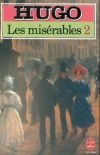
Kurjat on Victor Hugon kirjoittama romaani, joka ilmestyi vuonna 1862. Teos saavutti heti ilmestymisensä jälkeen suuren suosion. Tarina sijoittuu 1800-luvun alkupuolen Ranskaan ja seuraa monien henkilöiden yhteenkietoutuneita kohtaloita.

Pariisin Notre-Dame on Victor Hugon vuonna 1831 julkaistu romaani. Teos on on kuvaus keskiajan Pariisista. Se kertoo Notre-Damen kellonsoittajan eli ulkonäöltään epämuodostuneen Quasimodon, mustalaistyttö Esmeraldan sekä arkkidiakoni Claude Frollon tarinan. Keskeisiä henkilöhahmoja ovat myös runoilija Gringoire sekä …

Hesperus Press, as suggested by their Latin motto, Et remotissima prope, is dedicated to bringing near what is far—far both in space and time. Works by illustrious authors, often unjustly neglected or simply little known in the English–speaking world, are made accessible through a completely fresh editorial approach …

This scarce antiquarian book is a facsimile reprint of the original. Due to its age, it may contain imperfections such as marks, notations, marginalia and flawed pages. Because we believe this work is culturally important, we have made it available as part of our commitment for protecting, preserving, and promoting …

Ninety-Three is the last novel by the French writer Victor Hugo. Published in 1874, shortly after the bloody upheaval of the Paris Commune, the novel concerns the Revolt in the Vendée and Chouannerie – the counter-revolutionary revolts in 1793 during the French Revolution. It is divided into three parts, but not …

Kurjat on Victor Hugon kirjoittama romaani, joka ilmestyi vuonna 1862. Teos saavutti heti ilmestymisensä jälkeen suuren suosion. Tarina sijoittuu 1800-luvun alkupuolen Ranskaan ja seuraa monien henkilöiden yhteenkietoutuneita kohtaloita.

A critic in The Galaxy who admired Hugo's The Man Who Laughs (1869) and spoke with him about it called Hugo "a dreamer, a radical, a splendid, salient figure." It is one of his bitterest indictments of the cruelty and selfishness of society. Victor-Marie Hugo is known abroad for his novels, especially Les Miserables …

Kurjat on Victor Hugon kirjoittama romaani, joka ilmestyi vuonna 1862. Teos saavutti heti ilmestymisensä jälkeen suuren suosion. Tarina sijoittuu 1800-luvun alkupuolen Ranskaan ja seuraa monien henkilöiden yhteenkietoutuneita kohtaloita.

Hernani is a drama by the French romantic author Victor Hugo. The play opened in Paris on 25 February 1830. Today, it is more remembered for the demonstrations which accompanied the première, and for being the inspiration of Verdi's opera Ernani, than it is for its own merits. Hugo had enlisted the support of fellow …

 English
English Español
Español Deutsch
Deutsch
